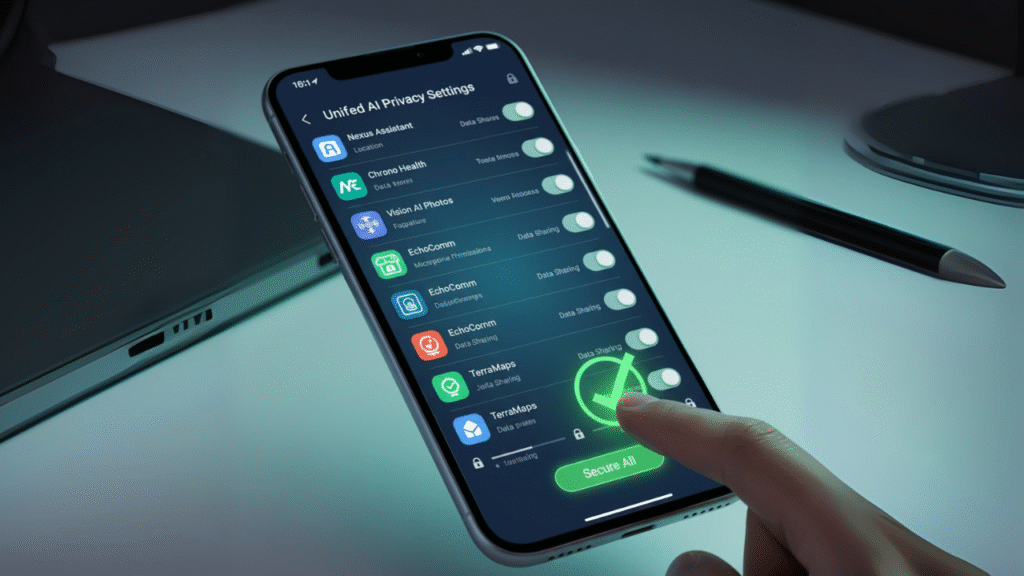That AI chatbot remembers everything you’ve ever told it—and shares it with 847 other companies. 🔒 Every question you ask, every document you upload, and every preference you express becomes part of a vast data collection network that most users never realize exists.
Recent investigations revealed that popular AI platforms store conversation histories indefinitely, analyze voice patterns to determine emotional states, and sell user insights to advertising networks. While you’re getting helpful AI responses, these companies are building detailed profiles of your personality, habits, and vulnerabilities.
With India’s Digital Personal Data Protection Act now in effect, you have more rights and protections than ever before. But knowing your rights means nothing without understanding how to exercise them. This guide provides 12 essential steps to protect your AI privacy while still enjoying the benefits these powerful tools offer.
The goal isn’t to avoid AI entirely—it’s to use it intelligently and safely.
The Hidden Data Collection Web

How AI Companies Harvest Your Data
Every AI interaction generates valuable data points. Chat conversations with tools like ChatGPT, Claude, or Bard are stored on company servers, analyzed for patterns, and used to improve AI models. Your writing style, vocabulary choices, and topic preferences create a unique “digital fingerprint” that can identify you across platforms.
Voice-powered AI assistants continuously analyze speech patterns, detecting stress levels, health conditions, and emotional states from vocal cues. Smart home devices powered by AI collect data about your daily routines, sleep patterns, and household activities, building comprehensive lifestyle profiles.
🚨 Privacy Risk Alert: Free AI tools often monetize through data collection rather than subscriptions, making your personal information their primary revenue source.
What They Actually Know About You
AI systems can deduce remarkable personal details from seemingly innocent interactions. Chat patterns reveal political views, relationship status, and financial stress levels. Voice analysis can detect early signs of depression, cognitive decline, or chronic health conditions. Location data from AI-powered apps tracks work schedules, social habits, and frequently visited places.
One AI company’s internal document revealed they could predict user income levels with 89% accuracy based purely on writing style and topic preferences in casual conversations.
The Data Marketplace Reality
Your AI interaction data gets packaged and sold to third-party companies for targeted advertising, insurance risk assessment, and employment screening. Some AI platforms share user data with government agencies under broad “national security” provisions. Even “anonymized” data can often be re-identified when combined with other information sources.
12 Essential Privacy Protection Steps

Immediate Actions (Do This Today)
Step 1: Review and Delete AI Chat Histories
Most AI platforms store your entire conversation history by default. Access your account settings and delete old conversations containing personal information. For ChatGPT, go to Settings > Data Controls > Chat History & Training. For Google Bard, visit myactivity.google.com and delete AI interaction records.
Step 2: Turn Off Data Sharing
Disable data sharing options in every AI tool you use. Look for settings like “Use my data to improve services” or “Share analytics with partners” and turn them off. This prevents your conversations from training future AI models.
Step 3: Use Incognito Mode for Sensitive Queries
When discussing health issues, financial problems, or personal relationships with AI, use your browser’s private/incognito mode. This prevents some tracking and ensures conversations aren’t saved to your main account.
Step 4: Create Separate Email for AI Signups
Use a dedicated email address for AI tool registrations. This limits data correlation between AI usage and your primary online identity, making it harder for companies to build comprehensive profiles.
Account Security Measures
Step 5: Enable Two-Factor Authentication
Secure all AI accounts with 2FA to prevent unauthorized access to your conversation histories and personal data. Use authentication apps rather than SMS when possible for stronger security.
Step 6: Use Unique Passwords
Never reuse passwords across AI platforms. A security breach at one AI company shouldn’t compromise your accounts elsewhere. Password managers make this easy to implement.
Step 7: Audit Connected Apps and Permissions
Regularly review which apps have access to your AI accounts. Remove permissions for unused services and limit data access to essential functions only.
Step 8: Set Up Automated Data Deletion
Where available, configure AI tools to automatically delete your data after specific timeframes. Some platforms offer 3-month, 6-month, or 1-year deletion schedules.
Smart Usage Habits
Step 9: Never Share Personal ID Numbers
Avoid entering Aadhaar numbers, PAN details, passport information, or bank account numbers in AI conversations. These can be used for identity theft if data breaches occur.
Step 10: Use General Examples
Instead of asking “Should I divorce my husband?” try “What factors should someone consider when evaluating marriage problems?” Generalize your queries to avoid revealing personal situations.
Step 11: Avoid Uploading Sensitive Documents
Don’t upload contracts, medical records, financial statements, or personal photos to AI analysis tools. Use sample or dummy data for testing AI capabilities.
Step 12: Choose Privacy-Focused Alternatives
Research AI tools with strong privacy policies. European AI services often have stricter data protection standards due to GDPR compliance.
AI Tool Privacy Ratings & Alternatives

High Privacy Risk Tools 🔴
Free AI chatbots with extensive data collection policies, social media AI features that integrate with advertising networks, and AI fitness apps that share medical data with insurance companies represent the highest privacy risks. Many popular AI tools fall into this category because they rely on data monetization.
Medium Privacy Risk Tools 🟡
Business AI tools with corporate data policies, educational AI platforms, and e-commerce AI recommendation systems typically have moderate privacy risks. They collect substantial data but usually have clearer usage policies and opt-out mechanisms.
Privacy-Friendly Alternatives 🟢
Open-source AI tools you can run locally, European AI services with GDPR compliance, and paid AI tools with privacy-first policies offer better protection. Indian AI companies following local data localization requirements also provide improved privacy safeguards.
🛡️ Recommended Privacy-First Options:
- DuckDuckGo’s AI Chat (no conversation storage)
- Anthropic’s Claude with privacy mode enabled
- Local AI models run on your device
- European AI services with GDPR compliance
Legal Protection & Rights in India

Your Rights Under Indian Data Protection Laws
The Digital Personal Data Protection Act grants you specific rights regarding AI data collection. You can request to know what personal data AI companies collect, demand deletion of your information, opt-out of data sharing arrangements, and transfer your data between services.
Exercising Your Rights
Send formal data deletion requests using company-provided forms or email templates. File complaints with the Data Protection Board of India if companies refuse compliance. Most AI companies must respond to valid requests within 30 days.
🚨 Red Flags: AI services without clear privacy policies, companies refusing data deletion requests, or lack of Indian data localization compliance indicate serious privacy risks.
Future-Proofing Your AI Privacy

Emerging Privacy Threats
AI-powered deepfakes using your uploaded photos, biometric data collection through AI apps, and cross-platform data correlation represent growing privacy challenges. Companies increasingly combine AI interaction data with social media profiles, shopping habits, and location data to create comprehensive behavioral predictions.
Advanced Protection Strategies
Use VPNs when accessing AI tools to mask your location and IP address. Choose privacy-focused browsers like Firefox or Brave for AI usage. Consider decentralized AI platforms that process data locally rather than on company servers.
Family Protection
Teach children to never share personal details with AI chatbots. Help elderly family members adjust privacy settings on smart devices. Establish household guidelines for safe AI usage, especially with devices that have always-listening capabilities.

Your Privacy, Your Choice
AI privacy protection isn’t about paranoia—it’s about informed choice. You can enjoy the remarkable benefits of AI assistance while maintaining control over your personal information. The key is understanding what data you’re sharing and making conscious decisions about acceptable privacy trade-offs.
These 12 steps provide immediate protection, but privacy is an ongoing process, not a one-time setup. As AI technology evolves, new privacy challenges will emerge, requiring continued vigilance and adaptation of your protection strategies.
Remember, privacy-conscious AI usage doesn’t mean avoiding these powerful tools entirely. It means using them intelligently, with full awareness of the data exchange involved and appropriate safeguards in place.
Protect your AI privacy now! Download our complete ‘AI Privacy Protection Toolkit’ with step-by-step guides, email templates for data deletion requests, and privacy settings screenshots for major AI platforms!
Which privacy step surprised you most? Share your AI privacy concerns and tips in the comments—your experience could help protect other users!
Stay secure with our upcoming guide: “AI Scams to Avoid: 10 Red Flags Every Indian Should Know” – because protecting your data is just the first step in safe AI usage.

